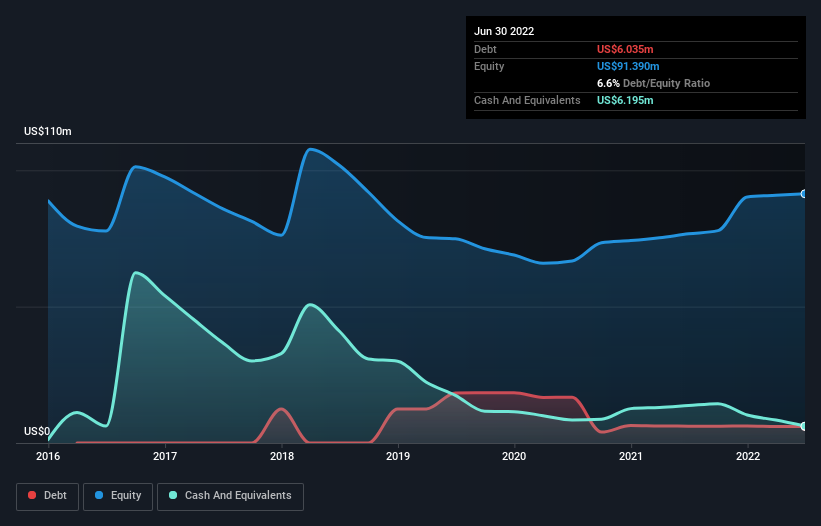The external fund manager backed by Berkshire Hathaway's Charlie Munger, Li Lu, makes no bones about it when he says 'The biggest investment risk is not the volatility of prices, but whether you will suffer a permanent loss of capital.' So it might be obvious that you need to consider debt, when you think about how risky any given stock is, because too much debt can sink a company. As with many other companies Gaia, Inc. (NASDAQ:GAIA) makes use of debt. But is this debt a concern to shareholders?
When Is Debt Dangerous?
Debt assists a business until the business has trouble paying it off, either with new capital or with free cash flow. Part and parcel of capitalism is the process of 'creative destruction' where failed businesses are mercilessly liquidated by their bankers. However, a more usual (but still expensive) situation is where a company must dilute shareholders at a cheap share price simply to get debt under control. Of course, debt can be an important tool in businesses, particularly capital heavy businesses. When we examine debt levels, we first consider both cash and debt levels, together.
Check out the opportunities and risks within the US Entertainment industry.
What Is Gaia's Debt?
As you can see below, Gaia had US$6.04m of debt, at June 2022, which is about the same as the year before. You can click the chart for greater detail. However, its balance sheet shows it holds US$6.20m in cash, so it actually has US$160.0k net cash.

How Strong Is Gaia's Balance Sheet?
The latest balance sheet data shows that Gaia had liabilities of US$26.8m due within a year, and liabilities of US$13.2m falling due after that. Offsetting this, it had US$6.20m in cash and US$2.97m in receivables that were due within 12 months. So it has liabilities totalling US$30.9m more than its cash and near-term receivables, combined.
This deficit is considerable relative to its market capitalization of US$45.8m, so it does suggest shareholders should keep an eye on Gaia's use of debt. Should its lenders demand that it shore up the balance sheet, shareholders would likely face severe dilution. While it does have liabilities worth noting, Gaia also has more cash than debt, so we're pretty confident it can manage its debt safely.
On the other hand, Gaia saw its EBIT drop by 4.9% in the last twelve months. That sort of decline, if sustained, will obviously make debt harder to handle. When analysing debt levels, the balance sheet is the obvious place to start. But it is future earnings, more than anything, that will determine Gaia's ability to maintain a healthy balance sheet going forward. So if you want to see what the professionals think, you might find this free report on analyst profit forecasts to be interesting.
Finally, a company can only pay off debt with cold hard cash, not accounting profits. Gaia may have net cash on the balance sheet, but it is still interesting to look at how well the business converts its earnings before interest and tax (EBIT) to free cash flow, because that will influence both its need for, and its capacity to manage debt. In the last two years, Gaia's free cash flow amounted to 49% of its EBIT, less than we'd expect. That weak cash conversion makes it more difficult to handle indebtedness.
Summing Up
Although Gaia's balance sheet isn't particularly strong, due to the total liabilities, it is clearly positive to see that it has net cash of US$160.0k. So while Gaia does not have a great balance sheet, it's certainly not too bad. The balance sheet is clearly the area to focus on when you are analysing debt. However, not all investment risk resides within the balance sheet - far from it. Be aware that Gaia is showing 4 warning signs in our investment analysis , you should know about...
When all is said and done, sometimes its easier to focus on companies that don't even need debt. Readers can access a list of growth stocks with zero net debt 100% free, right now.
New: Manage All Your Stock Portfolios in One Place
We've created the ultimate portfolio companion for stock investors, and it's free.
• Connect an unlimited number of Portfolios and see your total in one currency
• Be alerted to new Warning Signs or Risks via email or mobile
• Track the Fair Value of your stocks
Have feedback on this article? Concerned about the content? Get in touch with us directly. Alternatively, email editorial-team (at) simplywallst.com.
This article by Simply Wall St is general in nature. We provide commentary based on historical data and analyst forecasts only using an unbiased methodology and our articles are not intended to be financial advice. It does not constitute a recommendation to buy or sell any stock, and does not take account of your objectives, or your financial situation. We aim to bring you long-term focused analysis driven by fundamental data. Note that our analysis may not factor in the latest price-sensitive company announcements or qualitative material. Simply Wall St has no position in any stocks mentioned.
About NasdaqGM:GAIA
Gaia
Operates a digital video subscription service and online community for underserved member base in the United States, Canada, Australia, and internationally.
Excellent balance sheet and good value.
Similar Companies
Market Insights
Community Narratives



